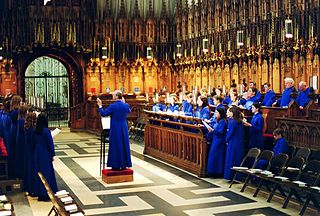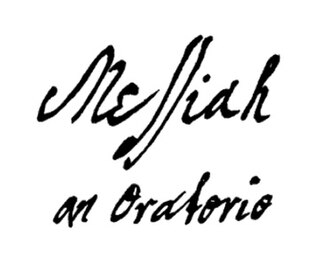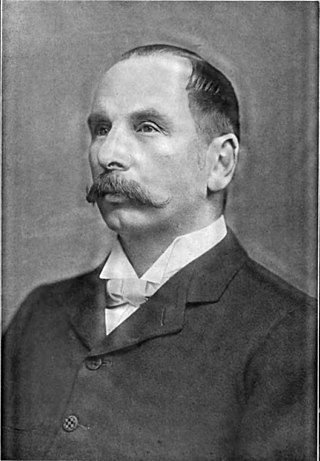
A choir is a musical ensemble of singers. Choral music, in turn, is the music written specifically for such an ensemble to perform. Choirs may perform music from the classical music repertoire, which spans from the medieval era to the present, or popular music repertoire. Most choirs are led by a conductor, who leads the performances with arm, hand, and facial gestures.

Messiah is an English-language oratorio composed in 1741 by George Frideric Handel. The text was compiled from the King James Bible and the Coverdale Psalter by Charles Jennens. It was first performed in Dublin on 13 April 1742 and received its London premiere nearly a year later. After an initially modest public reception, the oratorio gained in popularity, eventually becoming one of the best-known and most frequently performed choral works in Western music.
The Gramophone Classical Music Awards, launched in 1977, are one of the most significant honours bestowed on recordings in the classical record industry. They are often viewed as equivalent to or surpassing the American Grammy award, and referred to as the Oscars for classical music. They are widely regarded as the most influential and prestigious classical music awards in the world. According to Matthew Owen, national sales manager for Harmonia Mundi USA, "ultimately it is the classical award, especially worldwide."

The Royal Scottish National Orchestra (RSNO) is a Scottish orchestra, based in Glasgow. It is one of the five national performing arts companies of Scotland. Throughout its history, the Orchestra has played an essential part in Scotland’s musical life, including performing at the opening ceremony of the Scottish Parliament building in 2004.
The BBC Symphony Chorus is a British amateur chorus based in London. It is the dedicated chorus for the BBC Symphony Orchestra, though it performs with other national and international orchestras.
The Toronto Mendelssohn Choir is a Canadian large vocal ensemble based in Toronto, Ontario. It was co-founded in 1894 by Augustus S. Vogt and W. H. Hewlett to celebrate the opening of the Massey Hall. The ensemble was originally an extension of the choir of Jarvis St. Baptist Church in Toronto which Vogt directed and Hewlett accompanied. It is named after the German composer, Felix Mendelssohn.

A Scratch Messiah, People's Messiah, Come Sing Messiah, Sing-it-yourself Messiah, Do-it-yourself Messiah, or Sing along Messiah is an informal performance of Handel's Messiah in which the audience serves as the unrehearsed chorus, often supported by a carefully prepared core group. Orchestra and soloists are usually professionals, though their services are often donated for charity benefits. The "scratch" name derives from the idea of cooking or building from scratch.
Sarah Frances Beamish is a British composer and violist. Her works include chamber, vocal, choral and orchestral music. She has also worked in the field of music, theatre, film and television, as well as composing for children and for her local community.
Sydney Philharmonia Choirs is Australia’s largest choral organisation. It presents its own annual concert series in the Sydney Opera House the City Recital Hall, and other venues in New South Wales, as well as serving as chorus for the Sydney Symphony Orchestra.

Simon Halsey, CBE is an English choral conductor. He is the chorus director of the City of Birmingham Symphony Chorus, a position he has held since 1983, and has been chorus director of the London Symphony Chorus since 2012. He is also artistic director of the Berlin Philharmonic Youth Choral Programme and the director of the BBC Proms Youth Choir, and conductor laureate of the Berlin Radio Choir. He is professor and director of choral activities at the University of Birmingham.
John Butt is an English orchestral and choral conductor, organist, harpsichordist and scholar. He holds the Gardiner Chair of Music at the University of Glasgow and is music director of the Dunedin Consort with whom he has made award-winning recordings in historically informed performance. He is a prolific scholar, conductor and performer of works by Johann Sebastian Bach.
The London Philharmonic Choir (LPC) is one of the leading independent British choirs in the United Kingdom based in London. The patron is Princess Alexandra, The Hon Lady Ogilvy and Sir Mark Elder is president. The choir, comprising more than 200 members, holds charitable status and is governed by a committee of 6 elected directors. As a charity, its aims are to promote, improve, develop and maintain education in the appreciation of the art and science of music by the presentation of public concerts.
Les Sirènes is a Glasgow-based women's chamber choir consisting of 26 vocalists, all students and graduates of the Royal Conservatoire of Scotland. In October 2012, the choir was awarded the prestigious title of Choir of the Year 2012, after an extensive UK-wide search and a competitive Grand Final held at London's Royal Festival Hall.

Bristol Choral Society is a large mixed-voiced choir based in Bristol, England, founded in 1889. Currently conducted by Hilary Campbell, it has around 140 auditioned members. The choir stages at least three concerts annually at the Bristol Beacon in Bristol with professional orchestras and soloists, and another annually at Bristol Cathedral in addition to other performances and broadcasts in Bristol and further afield.
Adrian Frederick Partington is an English conductor, chorus master, organist and pianist. He is director of music at Gloucester Cathedral, joint conductor of the Three Choirs Festival and artistic director for the Gloucester festival years, director of the BBC National Chorus of Wales, conductor of Gloucester Choral Society, and former conductor of Bristol Choral Society and leader of the postgraduate choral conducting course at the Royal Welsh College of Music & Drama.

Ben Parry is a British musician, composer, conductor, singer, arranger and producer in both classical and light music fields. He is the Director of London Voices and Artistic Director of the National Youth Choirs of Great Britain.
Dunedin Consort is Scotland's leading baroque ensemble based in Edinburgh, Scotland, recognised for its vivid and insightful performances and recordings. Formed in 1995 and named after Din Eidyn, the ancient Brittonic Celtic name of Edinburgh Castle, Dunedin Consort’s ambition is to make early music newly relevant to the present day. Performing on period instruments, with choruses often numbering just one to a part, the group presents concerts that are both intimate and invigorating, often aiming to recreate the music as it was originally intended. Under the direction of John Butt, this has seen the ensemble earn two coveted Gramophone Awards – for the 2007 recording of Handel’s Messiah and the 2014 recording of Mozart’s Requiem – and a Grammy nomination. In 2018 it was shortlisted for a Royal Philharmonic Society Award in the Ensemble category.
Gregory Batsleer is a choral conductor. He is Chorus Director of the RSNO and SCO choruses.
A virtual choir, online choir or home choir is a choir whose members do not meet physically but who work together online from separate places. Some choirs just sing for the joy of the shared experience, while others record their parts alone and send their digital recordings, sometimes including video, to be collated into a choral performance. There may be a series of rehearsals which singers can watch online, and their performance recordings may be made while watching a video of the conductor, and in some cases listening to a backing track, to ensure unanimity of timing. The worldwide COVID-19 pandemic in 2020 inspired a large growth in the number of virtual choirs, although the idea was not new.
Daniel Kidane is a British composer. His piece "Woke" opened the last night of the 2019 Proms.






